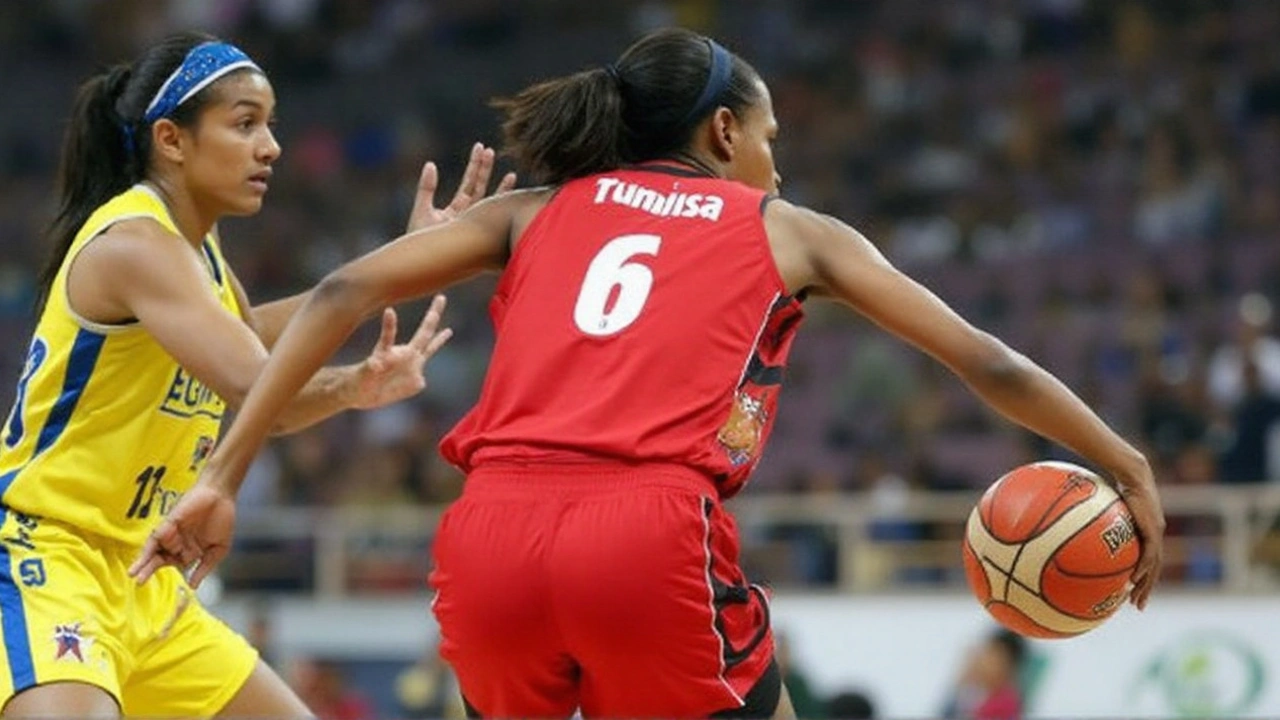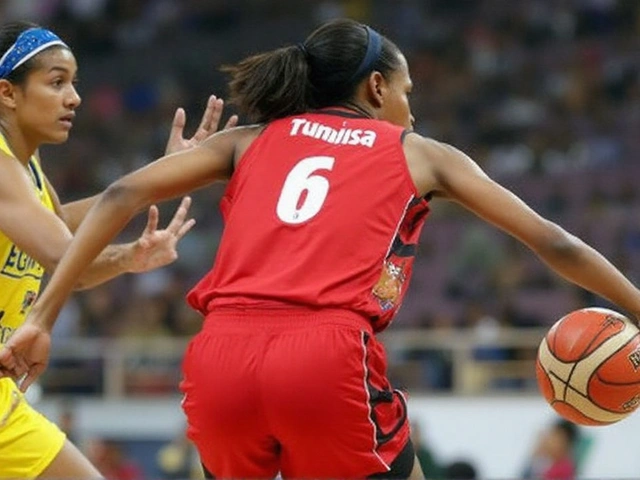
The scoreboard told two stories in Pretoria: Egypt and Tunisia kept winning, and Nigeria flipped a bad day into a statement win. After a rest day for all 12 teams, the 17th edition of the FIBA U18 Women's AfroBasket picked up speed, and the shape of the knockout rounds started to come into focus. The stakes are clear—this tournament also serves as Africa’s road to the 2025 Under-19 Women’s Basketball World Cup in the Czech Republic.
Egypt stay perfect as North African powers set the pace
Egypt haven’t put a foot wrong. They opened the tournament by beating Nigeria 72-60 and followed up with a one-sided Zone 5 derby win on Thursday to remain unbeaten. The numbers don’t just flatter them; the eye test matches the stat sheet. Their guards keep the tempo high, their wings crash the glass, and the bench doesn’t dip the intensity. It’s the blend every youth coach wants: discipline, length, and a willingness to make the extra pass.
The significance goes beyond a tidy record. With 12 teams split across three groups, staying perfect all but locks down a smoother path into the knockout phase. Group winners move toward direct quarterfinal berths, while second and third place usually face a play-in route. Egypt have positioned themselves exactly where they want to be: in control of their group and dictating matchups rather than reacting to them.
There’s also a clear regional theme. Tunisia matched Egypt’s clean slate to keep the North African push at the front of the pack. Different teams, similar pattern—tight defense, steady decision-making, and scoring runs built on stops more than flair. Tunisia have kept opponents uncomfortable by shrinking space in the half court and making every catch a battle. It isn’t flashy, but it travels well in a tournament setting where one five-minute lapse can flip a bracket.
Why does this matter now? Because seeding shapes everything. Unbeaten starts mean avoiding the bracket’s early landmines and letting the game plan, not panic, set the tone. Egypt and Tunisia have bought themselves time to fine-tune rotations and manage minutes—vital in a compact schedule where legs get heavy and mistakes snowball.
Nigeria blitz Zimbabwe to reset Group C
Nigeria came into Thursday with a point to prove after their opening loss to Egypt. They did that and more, running Zimbabwe off the floor 107-30 for their first win of the tournament. The opening minutes set the tone: a 29-5 first quarter built on pressure defense, quick outlets, and layups before Zimbabwe could organize. The second quarter was more of the same (27-7), and by halftime the result was beyond doubt.
Credit to Nigeria’s staff for using that cushion well. With only one player sitting out, coach Juliana Ojoshogu Negedu spread the minutes around and kept the guards fresh. That mattered after the break. Zimbabwe put together their best stretch in the third quarter, but Nigeria still took it 26-12 and closed the fourth 25-6.
Idubamo Beggi was a problem on both ends. She finished with 20 points and 10 steals—a rare double-double—plus 7 assists. When she wasn’t finishing at the rim, she was reading passing lanes and turning deflections into easy points. Momoluwa Ayomide Tewogbade played the perfect foil, adding 19 points, 7 rebounds, 6 steals, and 4 assists. Those two didn’t just stuff the box score; they set the standard for the team’s energy and focus.
Nigeria owned the glass too. Haminatu Ayodeji pulled down 12 rebounds and Abigail Isaac added 11, giving the guards the freedom to leak out and stretch the floor in transition. That interplay—secure the rebound, hit the outlet, punish mismatches—was the engine of the blowout.
Zimbabwe’s learning curve was steep, as it often is for first-time participants. Tinaishe Chiedza Daniele Chikwata led them with 13 points and kept competing even as the gap widened. The bigger issue was handling the ball against full-court heat. Traps at half court and late help at the nail forced rushed passes and tough catches. Zimbabwe showed more composure in the third quarter, but Nigeria’s length and pace kept the pressure high.
Key numbers from Nigeria vs Zimbabwe:
- First quarter: Nigeria 29-5
- Halftime: Nigeria 56-12
- Third quarter: Nigeria 26-12
- Fourth quarter: Nigeria 25-6
- Idubamo Beggi: 20 points, 10 steals, 7 assists
- Momoluwa Ayomide Tewogbade: 19 points, 7 rebounds, 6 steals, 4 assists
- Haminatu Ayodeji: 12 rebounds
- Abigail Isaac: 11 rebounds
- Zimbabwe’s top scorer: Tinaishe Chiedza Daniele Chikwata (13 points)
This wasn’t just a bounce-back win; it was a reset of Nigeria’s intent in the group. They’re back at 1-1, and they’ve rebuilt confidence after Egypt’s early punch. The rotation looked deep, the defense traveled, and the offense flowed without needing a hot shooting night. For a program returning to this competition for the first time since 2008, that’s a strong signal about the pipeline feeding into a senior team that has ruled the continent in recent years.
So what does it mean for Group C? Egypt sit in control after beating Nigeria and keeping their foot down on Thursday. Nigeria are positioned to grab a favorable seed if they close the group well, and Zimbabwe—winless in two—are likely staring at a tougher path through classification and play-in games. With 12 teams split into three groups of four, the format rewards early wins and depth. Group winners move closer to direct passage into the quarterfinals, while second and third usually face a qualification step to get there. Fourth place tends to slide into classification games for final ranking.
There’s more at stake than just medals. The competition doubles as Africa’s qualifier for the Under-19 Women’s Basketball World Cup in 2025. The standard for getting out of Africa is high, which is why these early reads on defense, pace, and rebounding matter. Teams that rebound by committee and limit live-ball turnovers usually last into the final weekend.
A quick note on rhythm and recovery: Thursday’s games came after a full rest day, and you could see the legs in the way teams defended. Nigeria’s closeouts were sharper, their second efforts on the glass were cleaner, and the line-change substitutions kept pressure constant. Coaches know that group-stage minutes can make or break the quarterfinals. If you can bank a blowout, you bank energy for when you inevitably run into a team that won’t turn the ball over 20 times.
For Zimbabwe, there were still takeaways they can use. The third quarter showed they can settle into sets and get touches for their scorers when they break pressure with the pass rather than the dribble. Small wins matter in debut tournaments. The next step is cutting the empty trips—the long passes that sail out, the deep catches near the sideline that invite traps, the hesitations that turn into tie-ups. Clean those up, and games stop snowballing.
For Egypt and Tunisia, the path is about keeping control. Unbeaten runs through the group stage mean more practice time than scouting panic. It means polishing late-game sets and rehearsing what happens when the first option is taken away. It also means trimming the turnovers that creep in when a game looks safe. Nothing flips momentum in youth tournaments like a couple of careless passes and a runout or two.
As the group stage closes in on its final round, the brackets are starting to make sense. Egypt and Tunisia sit where they want to be. Nigeria have reintroduced themselves after a rough opener, and Zimbabwe have a clearer view of the standard they need to reach. The next few days will sort out who gets a clean quarterfinal lane and who has to grind through a play-in. Either way, the message from Thursday was simple: defense and depth are deciding the early storylines in Pretoria.








It is utterly astonishing how Egypt and Tunisia have orchestrated such impeccable performances; the statistics alone are a testament to their disciplined execution. One cannot help but marvel at the precision with which their guards maintain tempo, reminiscent of a well-rehearsed symphony. Moreover, the rebounding prowess exhibited by both squads illustrates a commendable commitment to fundamentals. Their defensive schemes, while seemingly austere, are executed with an elegance that belies their apparent simplicity. In sum, their current trajectory suggests a foreseeable dominance in the forthcoming knockout stages.
Ah, the perennial narrative of "perfect records" and "dominant displays" – how refreshingly predictable. One must, of course, acknowledge that the semblance of invincibility is often a veneer meticulously crafted by those wielding the power of selection bias. While Egypt and Tunisia bask in their unblemished sheets, let us not overlook the systemic inequities that render other nations merely footnotes in this grand tableau. The absence of robust competition, coupled with an infrastructure that favours the historically affluent, inevitably skews any purported meritocracy. One could argue, with a wry smile, that these victories are as much a product of circumstance as of skill. Moreover, the very metrics employed to gauge superiority – points per game, rebounds, steals – are reductive, as if the beautiful chaos of sport could be distilled into mere numbers. It is a comforting illusion, but an illusion nonetheless. The overt emphasis on defensive rigidity, for instance, masks an underlying stagnation in tactical evolution. In a continent teeming with untapped potential, such conformity is a lamentable tragedy. Certainly, the coaches invoke strategic brilliance, yet one must wonder whether such rhetoric conceals a paucity of creative ingenuity. The relentless adherence to a formulaic approach threatens to engender a homogeneity that stifles the sport's natural dynamism. And let us not be oblivious to the psychological toll exacted upon fledgling teams that perpetually confront the monolith of North African hegemony. Their aspirations are routinely eclipsed, their progress throttled by an entrenched hierarchy. It is, perhaps, an admonition to the governing bodies to reflect upon the equity of resource allocation. In closing, while the current ephemera of undefeated runs may dazzle the untrained eye, a deeper examination reveals a tapestry woven with threads of privilege, inertia, and complacency.
Yo, you ever notice how every time a team blows out another, the same folks behind the scenes whisper about "secret training facilities"? It's like they're saying the game ain't about skill, it's about hidden agendas. And if you think the stats are clean, think again – there's always that one hidden camera feeding info to the elite. I mean, they got the whole world watching, but only the chosen few get the real playbook. Something's definitely off, bro.
Keep your head up! Great effort on the court – every rebound counts.
Stay focused, the next game will be even better.
In the grand theatre of youth basketball, every dribble echoes the lament of forgotten dreams.